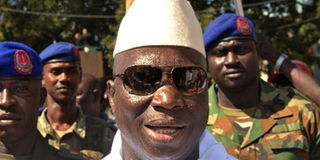Gambia says nine prisoners executed by firing squad

A picture taken on November 24, 2011 shows Gambian president Yahya Jammeh speaking to journalists as he leaves a polling station in the capital Banjul after voting in the presidential elections. Amnesty International on August 24, 2012 said that Gambia had executed nine death row prisoners, after President Yahya Jammeh vowed to carry out all death sentences by mid-September. Photo/AFP
What you need to know:
- Amnesty International reported the execution of the nine prisoners on Saturday
- The European Union on Monday condemned the executions and demanded they stop.
Gambia's interior ministry said Monday nine death row prisoners had been executed by firing squad, after President Yahya Jammeh vowed to carry out all death sentences by mid-September.
In a statement the ministry named nine people, including one woman, who were "executed by firing squad on Sunday 26th August 2012" after they were sentenced to death and all their appeals had been exhausted.
"The general public is hereby warned that the rule of law as regards the peace and stability and the protection of lives, property and liberty will not be compromised for whatever reason," read the statement.
Amnesty International reported the execution of the nine prisoners on Saturday, a day before the government said it took place and just days after an African Union envoy urged Jammeh to renounce his plans to execute all 47 death row prisoners.
In a televised address to mark this year's Muslim feast of Eid al-Fitr on Sunday Jammeh said: "By the middle of next month, all the death sentences will have been carried out to the letter.
"There is no way my government will allow 99 per cent of the population to be held to ransom by criminals."
One of the men executed, Dawda Bojang, had been convicted for murdering British tourist Ronald Stanley Ford in 2002.
Two of the prisoners were Senegalese, one of them a woman, Tabara Samba, convicted in 2007 of murdering her husband by pouring hot cooking oil over him after he took a second wife.
Three of the dead were soldiers who were convicted in 1998 of treason and murdering two fellow soldiers.
While the last official execution took place in 1985, AFP's correspondent in Banjul said that executions in Gambia, a sliver of land wedged into Senegal, have continued unofficially with the most recent taking place in 2007.
Jammeh, a former military officer who seized power in a 1994 coup, brooks no dissent in a country often blasted by rights bodies for abuses.
Many top officials have found themselves charged with treason, often related to coup plots which observers have said are a sign of paranoia by Jammeh, who won a fourth term in office in November 2011.
Last year eight military top brass, including the former army and intelligence chiefs and the ex-deputy head of the police force, were sentenced to death for treason.
The European Union on Monday condemned the executions and demanded they stop.
"I demand the immediate halt of executions," EU foreign policy chief Catherine Ashton said in a statement.
"I recall the (Gambian government's) international commitments, as well as the commitments concerning the respect of human rights contained in the Cotonou Agreement, which governs relations between the European Union and The Gambia."
She added: "In light of these executions, the European Union will urgently consider an appropriate response."




